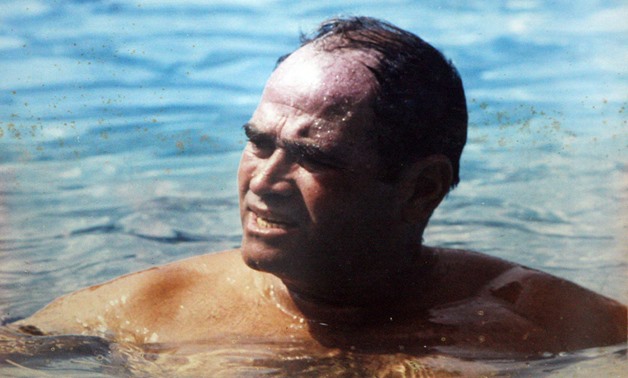
Abdel Latif Abu Heif - Photo credit by Ahmed Ismail
CAIRO – 30 January 2018: You might have heard about Farida Osman or Rania Elwani as the most famous Egyptians who wrote the history of swimming, but you may not know about the “Crocodile of the Nile.” A man who managed to dominate international open water swimming competitions in the 1950s and 1960s, winning around 20 major world competitions. His name is Abdel Latif Abu Heif.
Egypt Today celebrates Abu Heif’s birthday. Born on January 30, 1929 in Alexandria, Egypt to an athletic family; he was drawn to swimming even though the rest of them played table tennis. Abu Heif began a habit of winning trophies at a young age.
Abu Heif chose swimming after watching “Tarzan the Ape Man”, which was in theaters in 1932. He admired the star of the movie, Johnny Weissmuller, who himself was an actor and swimmer. Weissmuller won five Olympic gold medals in the 1920s.
Abu Heif started to frequent public swimming pools in El Anfoushy, one of the oldest neighborhoods in Alexandria, when he was only 10 years old. He won his first title in 1939; the Swimming Juniors’ Championship of Alexandria.
His legacy was recognized internationally in 2001 when Abu Heif was granted the 20th Century Swimmer award because of his great legacy in swimming, and the International Swimming Federation named him the greatest swimmer in history after he crossed the English Channel three times.
In 1953, the Egyptian Crocodile visited French swimmer Georges Valery, who had just become paralyzed, to promise him that if he won the Seine River Race in France, he would dedicate the prize to Valery. Abu Heif didn’t deliver on his promise to the Frenchman and dedicated the £5,000 to him after he won first place. This was the first major title he achieved in his professional career.
.jpg)
Abu Heif was ranked among the world’s top marathon swimmers which consequently led to him being invited to participate in the 1955 cross-Channel race. In this race, the swimmer starts either from Cap Gris-Nez in France or from Shakespeare Beach, Dover in the UK. This distance is 18.2 nautical miles, which is approximately equivalent to 21 miles on land.
That particular year’s race witnessed strong competition, as a lot of a top swimmers were participating, such as American open-water champion Tom Park, Syder Guiscardo of Argentina, and Belfast's Jack McClelland. Despite that, Abu Heif managed to take first place and win the race’s £1,000 prize. He also donated the prize money to the family of British swimmer Mathews Web, who drowned in the same race.
King Farouk I of Egypt and Sudan wanted to honor Abu Heif after his achievements and asked the champion about his most desired wish. Abu Heif asked to enter the best military academy in the world and King Farouk granted him his wish, sending him to study at Sandhurst Military Academy in the United Kingdom.
The swimmer’s achievements in the 1960s went beyond the European continent; Abu Heif won the longest open-water race in the world in 1963 at Lake Michigan in the United States, swimming around 135 kilometers.
Perhaps the greatest of Abu Heif’s achievements came in 1965 when he participated in Montreal’s International Race against the top swimmers of the world in a relay race. Each swimmer was supposed to swim for an hour before handing off to his teammate.
Italy’s Giulio Travaglio was the Egyptian’s teammate, but he unfortunately couldn’t continue the race as he suffered from pneumonia. This forced Abu Heif to continue the race and swim for 29 hours alone, while the other swimmers shared the distance together. Nevertheless, he achieved the amazing feat of winning the race.
The Alexandrian decided to retire in 1975 at the age of 46, deciding to concentrate on his personal life, as he had a child who suffered from kidney failure at a very young age.
.jpg)
The Egyptian government honored him several times naming a beach after him in his home town of Alexandria, in addition to naming many streets after him in Alexandria and Cairo.
The Crocodile of the Nile bid everlasting farewell to the El Anfoushy swimming pool, the English Channel, Lake Michigan, the Great Nile and the Egyptian people for the final time on April 21, 2008.

.jpg)
.jpg)

Comments
Leave a Comment